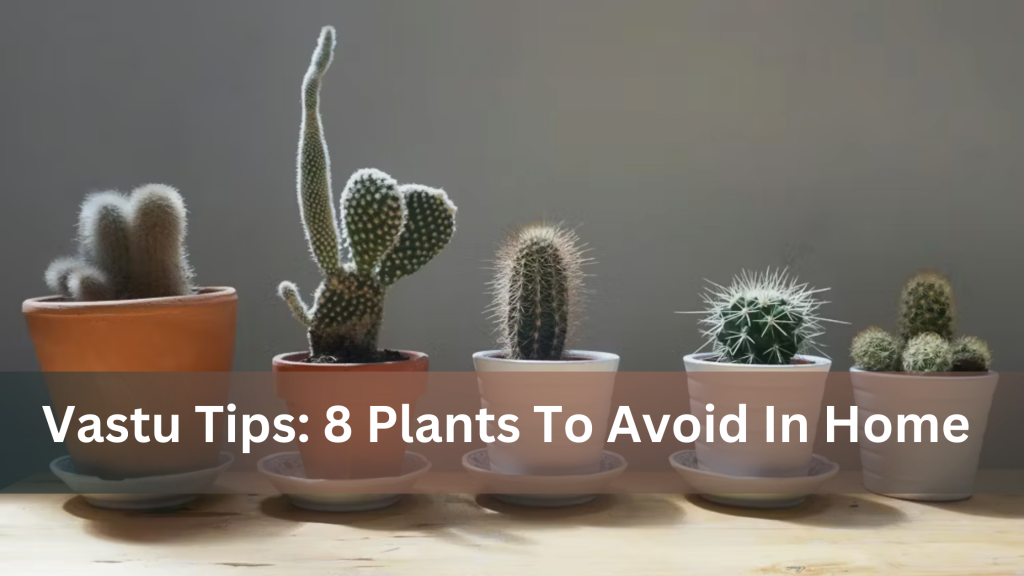Vastu Shastra, the ancient Indian science of architecture and design, provides guidelines for creating harmonious living spaces that promote health, prosperity, and well-being. One important aspect of Vastu is the placement and selection of plants within the home. While many plants are believed to bring positive energy, some are considered inauspicious and can create negative vibrations. Here are eight plants that should never be grown at home according to Vastu Shastra.
1. Cactus
Why Avoid:
Cacti are known for their sharp thorns, which can emit negative energy and cause stress and anxiety within the home. According to Vastu, the thorny nature of cactus plants can also lead to conflicts and tensions among family members.
Alternative:
Opt for non-thorny, flowering plants like the peace lily or jasmine, which are known to bring peace and harmony.
2. Bonsai
Why Avoid:
Bonsai trees, despite their aesthetic appeal, are considered inauspicious in Vastu. They symbolize stunted growth and can negatively impact the prosperity and progress of the household members.
Alternative:
Choose full-grown plants that symbolize growth and abundance, such as bamboo or money plants.
3. Tamarind
Why Avoid:
Tamarind trees are believed to attract negative energies and can create an inauspicious atmosphere in the home. They are often associated with ghosts and spirits in traditional beliefs.
Alternative:
Consider planting a neem tree outside the home, which is known for its purifying and protective properties.
4. Mehendi (Henna)
Why Avoid:
Mehendi plants are associated with mourning and sadness in Vastu Shastra. Growing these plants at home can bring about negative emotions and feelings of sorrow.
Alternative:
Replace mehendi with fragrant and uplifting plants like roses or marigolds to enhance positivity.
5. Dead or Dried Plants
Why Avoid:
Keeping dead or dried plants at home is highly discouraged in Vastu as they represent stagnation and decay. They can hinder the flow of positive energy and bring about a sense of gloom.
Alternative:
Ensure that all plants in your home are healthy and thriving. Remove any dead or dying plants immediately to maintain a vibrant and energetic environment.
6. Cotton Plant
Why Avoid:
Cotton plants are believed to attract negative energy and are associated with bad luck and financial instability. Growing cotton plants at home can lead to economic hardships.
Alternative:
Opt for plants that symbolize prosperity and financial growth, such as the jade plant or the lucky bamboo.
7. Babul (Acacia)
Why Avoid:
Babul trees, with their thorny branches, are considered inauspicious in Vastu Shastra. They can cause strife and conflicts among family members and should be avoided at home.
Alternative:
Choose smooth-leaved plants like the rubber plant or the areca palm, which are known for their positive energy and air-purifying properties.
8. Peepal Tree
Why Avoid:
Although the peepal tree is considered sacred and worshiped in many cultures, it is not recommended to grow it at home. It is believed to attract ghosts and spirits, which can create an unsettling atmosphere.
Alternative:
Plant a tulsi (holy basil) plant instead. Tulsi is revered for its spiritual significance and ability to purify the surroundings.
Tips for Maintaining a Vastu-Compliant Garden
Choose Plants Wisely:
Select plants that are known for their positive energy and growth-promoting qualities, such as tulsi, money plant, bamboo, and jasmine.
Healthy Plants:
Ensure that all plants are healthy and well-maintained. Regularly water and care for them to keep them vibrant and thriving.
Plant Placement:
Place plants in the right direction according to Vastu principles. For example, tulsi should be placed in the north, east, or northeast direction.
Regular Maintenance:
Remove any dead or dried leaves and flowers promptly. Keep the garden clean and clutter-free to maintain positive energy.
By adhering to these Vastu guidelines and avoiding the plants mentioned above, you can create a harmonious and positive living environment. Remember, the right plants not only enhance the beauty of your home but also contribute to your overall well-being by attracting positive energy and prosperity. Embrace the wisdom of Vastu Shastra and cultivate a garden that brings peace, happiness, and growth into your life.







